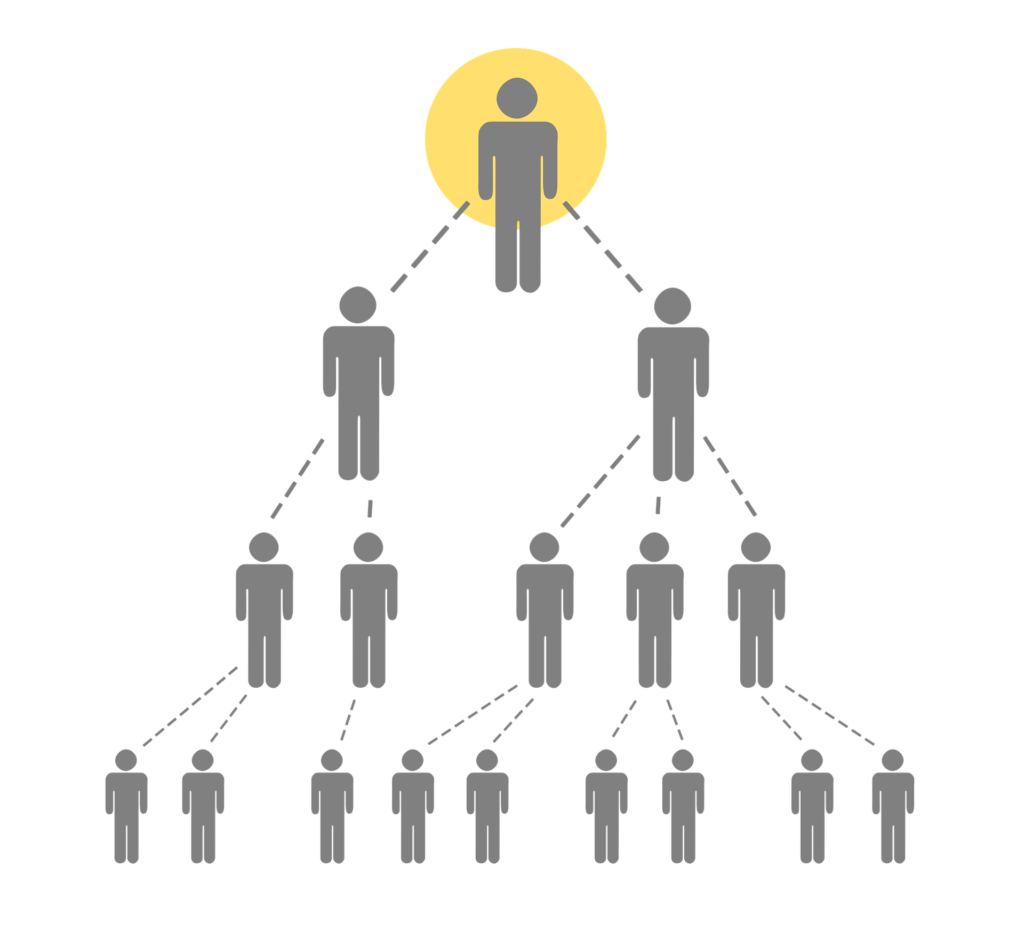What is Pyramid Selling ?

Pyramid selling is a fraud. It is a mechanism by which promoters of so-called “investment” or “trading” schemes enrich themselves in a geometric progression through the payments made by recruits to such schemes. Related deceitful schemes have been described in various international jurisdictions as “chain letters,” “snow balls,” “chain selling,” “money games,” “referral selling” and “investment lotteries”.
Numerous legislatures around the globe have proscribed pyramid selling. The wording of relevant statutes, codes, articles, acts, regulations and the like vary, but all contain the following core concept: A pyramid is a scheme in which a recruit pays (an entry fee) for the opportunity to receive future benefits (money or privileges) which are primarily derived from that recruit’s (and/or subsequent recruits’) introduction of additional participants in the scheme, rather than from the sale of products to consumers.
Pyramid schemes are not commercially sustainable because they essentially assume an inexhaustible flow of recruits – all willing to pay to enter the scheme and to be enriched by subsequent recruits doing the same thing. As the number of available recruits is finite, however, successive recruits have arithmetically less chance of enrichment than the schemes’ promoters. Consequently, such schemes are usually short-lived and those who enter last have virtually no chance of recovering their entry fee much less benefiting from the scheme.

Early pyramids were readily identified and successfully proscribed because of their lack of tangible product. Subsequent fraudulent schemes, however, have attempted to deceive the public and avoid prosecution by asserting that they are genuine businesses operating a multilevel marketing plan since they “sell” goods and services. Multilevel marketing is, of course, a well-recognized means of compensating direct sellers for the sale of products to consumers, including participants in the plan, through a network of independent distributors.
A closer inspection of a pyramid scheme’s so called “products” typically reveals that they have no real market value. This is because the products are often “gimmicks” such as certificates, spurious training programs or magazine subscriptions, illusory discounts, or over-priced and under-performing “miracle” treatments and the like. Recruits are often obliged to “invest” in large quantities of these products with no realistic prospect of marketing them to actual consumers (or returning them for credit). Their investments, however, generate substantial income for the promoter who enticed them into the scheme.
How to Differentiate Illegal Pyramids from Lawful Direct Selling Businesses ?
Illegal Pyramid Scheme & Legitimate Multi-Level Marketing Structure Versus Operation
Almost all organisations, irrespective of whether they belong to direct-selling, conventional business or government departments, are pyramidal or hierarchal in structure.
In terms of structure, therefore, there is some similarity between pyramid schemes and all other organisations. The important distinction between pyramid schemes and other organisation, however, is in the operational area. That is to say, does its operations follow a chain letter principle? In terms of income, do members of the organisation derive income from the mere act of recruiting? Are there actual sales to end consumers in the company’s operations? To join the business, do participants have to pay a high entry fee? And if one wishes to opt out of the business, is there a provision for him to recover his money?
Differences Between Legitimate Direct Selling Companies & Pyramid Schemes
Legitimate Direct Selling Companies
Pyramid Schemes
The start-up fee for all ethical multi-level selling companies is generally low, primarily to cover training materials, sales aids or demonstration kits.
Pyramid schemes often disguise high entry fees as part of the price charged for required purchases of training, product inventory etc. Pyramid schemes make virtually all their profits from recruiting.
Such companies sell a wide range of quality products to the general public. The bulk of the sales are on repeat sales form satisfied customers. This is only possible because these companies spend millions on research and development to develop quality products.
Pyramid schemes are frequently disguised to appear as legitimate direct selling companies. Such schemes are not interested in marketing these products which are of dubious value. Instead, money is made in typical pyramid fashion, from recruiting, with new distributors being pushed to purchase high cost/large inventory when they sign up.
Many companies have a 100 percent money-back guarantee. Dissatisfied users (and there are relatively few) could exchange the products back for money or for an equivalent amount in other products.
Pyramid schemes will not buy back unsold inventory. Such schemes will collapse very quickly if there is this condition for re-purchase of goods.
These companies are interested in long-term business. In every country that they operate, this criterion is important because the companies have an obligation to their distributors who are small businessmen in their own rights.
Pyramid schemes are get-rich quick schemes. The nature of the pyramids, in which large numbers of people at the bottom of the pyramid pay money to a few people at the top, clearly explains why the scheme cannot sustain itself for long.
Recognition of achievement is based on efforts. This means that a distributor’s income is commensurate with the efforts he/she puts into the business.
Position could be purchased.
Established companies depend on selling to customers quality products which offer value for money in order to establish a market.
Pyramid schemes are not concerned with repeat sales to users of the products. Profits are made on volume sales to new recruits who buy the products not because they are useful or attractively priced, but because they must buy them to participate in the scheme. As a result, new participants are stuck with products that are way below the market value in relation to the high entry fees paid by them. Should the pyramid scheme collapse, there is no way for the participants to recover their “investments”.
These companies build up networks of independent distributors to sell products.
Promoters of a pyramid scheme are engaging in fraud, knowingly deceiving participants in the schemes.
They have strict Rules of Conduct which, among other things, forbids its distributors to load up on inventory.
Participants in a pyramid scheme have no choice but indulge in inventory loading/high fees to participate.
Distributors sell products and or services.
Participation is essentially based on recruiting, not necessarily on the sale of products or services.
Direct selling is a popular method of retailing which is recognised as a lawful and legitimate business in many countries including the U.S.
Pyramid schemes have been outlawed throughout the United States and many countries many countries around the world.
Become A Member Today
Do you wish to join as a DSAM Member Company ? You can access exclusive content, just for you here !
